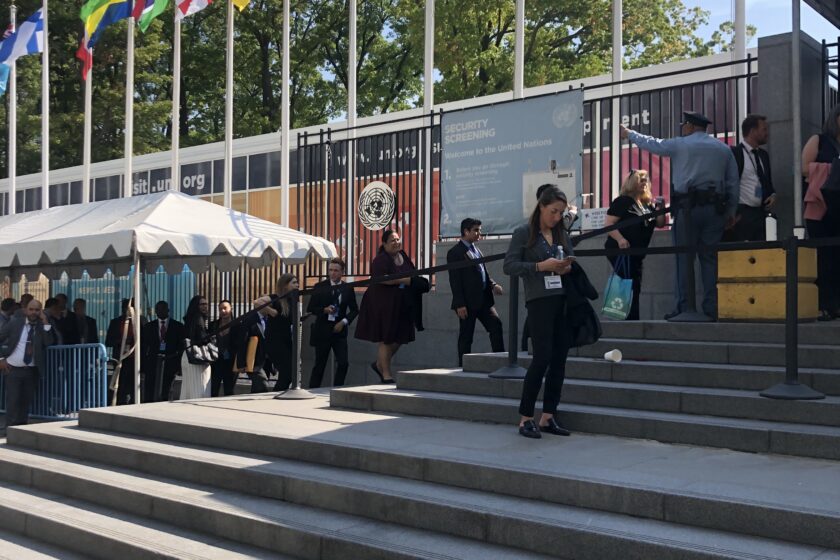The UN Climate Action Summit took place in New York City from September 21st to 23rd against a backdrop of massive youth climate strikes around the world, a hoped-for announcement by large industrialized nations of further reductions of greenhouse gas emissions and a planet that is warming at an alarming rate, even exceeding the projections of recent climate studies.
The most poignant moment during the Summit, was when Donald Trump walked unexpectedly into the General Assembly hall to carouse informally for a few minutes and 16-year-old Swedish climate activist Greta Thunberg, who was about to address the Summit, glowered at him intently. Her look of rage and condemnation was the collective expression of 4 million youth climate activists who demonstrated around the globe on the Friday before the Summit. As expected, Trump did not address the Summit, as he and other world leaders of the industrialized countries who are major emitters of carbon dioxide, were not invited to speak, since they had made no announcements ahead of the meeting to promise significant cuts in any of their country’s contributions of emissions.
When Greta spoke to the nations of world body, she thundered with harsh criticism at their failure to take urgent and drastic steps to eliminate carbon emissions that threaten all life on Earth.
You have stolen my dreams and my childhood with your empty words, she cried.
We are in the beginning of a mass extinction and all you can talk about is money and fairy tales of eternal economic growth.
How dare you?!
UN Secretary-General Guterres warned world leaders ahead of the Summit, not to come with beautiful speeches, come with concrete plans for carbon neutrality by 2050.
The US, China and India are among the biggest carbon emitters. The US, with only 4 percent of the world’s population, each year emits 15 percent of global greenhouse gases. The European Union’s 28 countries contribute 10 percent annually. China emits almost 30 percent and India 7 percent.
The non-binding commitments to reduce greenhouse gases made by nations at the 2015 Paris Climate Accords, have not been kept by a majority of them. But a bright hope, among the many disappointments at the 2019 Climate Summit, was from new commitments made by Germany, New Zealand and several small nations that announced even greater reductions than the promises made in Paris. German Chancellor, Angela Merkel announced a $60 billion government program to get Germany back on track to meet its commitments made in Paris. Germany said it will reduce carbon emissions by 55 percent of 1990 levels by 2030. The key feature of Germany’s program is to charge transportation and heating fuel companies 10 euros per ton of carbon emitted. The cost per ton will increase to 35 euros by 2025.
Several other countries made commitments to update emissions reductions targets by 2020 and to achieve net zero emissions by 2050. They include many small island nations that are the most vulnerable to sea level rise from a heating planet, but the least responsible for climate change. The are the Marshall Islands, Belize, Costa Rica, Fiji, Grenada, Saint Lucia and Vanuatu. Norway, Sweden, Denmark, the Netherlands, Luxemburg, Monaco, New Zealand and Switzerland also joined the pledge of zero emissions by 2050. These European and small developing countries account for only 6.9 percent of global emissions according the World Resources Institute, but they hope by their example to convince other nations to make similar commitments.
At the end of the UN Climate Action Summit, sixteen children from five continents, including Greta Thunberg, filed a formal complaint under the Convention on the Rights of the Child, against five countries, Germany, France, Brazil, Argentina and Turkey. They claim that their human rights as children have been violated by the failure of those countries to take adequate measures to reduce emissions that cause the climate crisis.
The 25th session of the United Nations COP, Conference of the Parties on climate change will take place in Santiago, Chile from the 2nd to 13th of December. The UN COP is an annual event whose purpose is to assess each country’s progress in dealing with climate change and to establish, legally, binding obligations for each country to reduce greenhouse gas emissions. Brazil was to host the COP, but Jair Bolsonaro, Brazilia’s President pulled out. Bolsonaro has been widely condemned for policies to remove environmental protections including promoting further deforestation of the Amazon by private ranchers and farmers. Chile’s President Sebastian Pinera and environment minister Carolina Schmidt announced, it’s time for action on climate change.
Considering the disappointments at the September Climate Summit in the failure of countries who are the major contributors of climate change to keep commitments made in Paris in 2015, or step up to further reduce those commitments to keep temperatures below the 1.5 C degree threshold, there will be much work to be done in Chile in 2019.
